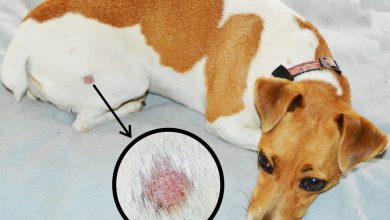Why Does My Dog Bite His Tail Until It Bleeds

1. Introduction
Tail-biting is a common behavior among dogs, but it can be concerning if your dog is biting his tail until it bleeds. This behavior can be caused by a variety of factors, including stress, boredom, and even medical issues. In this article, we will explore the possible causes of tail-biting in dogs and discuss how to prevent and treat this behavior.
2. Reasons Why Dogs Bite Their Tails
In most cases, tail-biting is an instinctive behavior that dogs may engage in for a variety of reasons. It may be a way to relieve stress or boredom, to groom themselves, or even as a way to express their excitement or playfulness. However, in some cases, tail-biting can be the result of an underlying medical issue or behavioral problem.
3. Signs of Tail Biting in Dogs
The most obvious sign that your dog is biting his tail is if you see him doing it. You may also notice bald patches on the tail or fur loss near the base of the tail where he has been biting it repeatedly. Additionally, you may notice redness or swelling on the tail due to the repeated biting and licking.
4. Possible Causes of Tail Biting in Dogs
There are several possible causes of tail-biting in dogs. These include:
• Stress: Dogs may bite their tails as a way to relieve stress or anxiety. This type of tail-biting usually occurs when a dog is feeling overwhelmed or anxious due to changes in their environment or routine.
• Boredom: If your dog is not getting enough mental stimulation or physical exercise, they may start to bite their tails out of boredom.
• Medical Issues: In some cases, dogs may bite their tails due to an underlying medical problem such as allergies or skin irritation.
• Behavioral Problems: Dogs may also bite their tails as a way to express dominance or aggression towards other animals or people in the household.
5. The Impact of Stress on Tail Biting in Dogs
Stress can have a significant impact on the frequency and intensity of tail-biting in dogs. If your dog is feeling anxious due to changes in their environment or routine, they may start to bite their tails as a way to relieve that stress and anxiety. Additionally, if your dog is feeling overwhelmed by new people or animals in their environment, they may also start to bite their tails out of fear and anxiety.
6. How to Prevent Your Dog from Biting His Tail Until it Bleeds
The best way to prevent your dog from biting his tail until it bleeds is by addressing any underlying causes such as stress and boredom. Make sure your dog has plenty of physical exercise and mental stimulation throughout the day so they don’t become bored and stressed out easily. Additionally, try introducing new people and animals slowly into your home so that your dog has time to adjust and get used to them before feeling overwhelmed by them. You should also consult with your veterinarian about any possible medical issues that could be causing your dog’s tail-biting behavior so that you can address those issues appropriately as well.
7 What To Do If Your Dog is Already Biting His Tail Until it Bleeds
If your dog is already biting his tail until it bleeds, there are several things you can do to help stop this behavior:
• Distract them with toys: Offer your dog toys when they start biting their tails so they can focus on something else instead of biting themselves.
• Provide mental stimulation: Make sure your dog has plenty of mental stimulation throughout the day with interactive toys and puzzles so they don’t get bored easily and resort to tail-biting out of boredom.
• Address any underlying medical issues: Consult with your veterinarian about any possible medical issues that could be causing your dog’s tail-biting behavior so that you can address those issues appropriately as well.
• Use calming aids: If stress is causing your dog’s tail-biting behavior, there are several calming aids available such as pheromone sprays and calming collars that can help reduce anxiety levels in dogs who are feeling overwhelmed or stressed out easily.
8 When To See A Vet For Tail-Biting Issues
If you have tried all these methods but still see no improvement in your dog’s tail-biting behavior after two weeks, then it’s time to consult with a veterinarian for further advice on how best to address this issue with your pet. Your vet will be able to assess any underlying medical conditions that could be causing this behavior and provide advice on how best to treat them accordingly so that you can finally put an end to this destructive behavior once and for all!
9 Common Treatments For Tail-Biting Issues
If there are no underlying medical conditions causing your pet’s tail-biting issue, then there are several treatments available that can help reduce its intensity and frequency:
• Behavior modification: Your vet may suggest some basic behavior modification techniques such as positive reinforcement training which rewards good behaviors while discouraging bad ones through consistent repetition over time until the desired behaviors become second nature for your pet;
• Medication: In some cases, medications such as antihistamines may be prescribed by vets for allergy relief;
• Calming aids: As mentioned earlier, there are several calming aids available such as pheromone sprays and calming collars which can help reduce anxiety levels in dogs who are feeling overwhelmed or stressed out easily;
10 Tips For Keeping Your Dog Calm And Relaxed
>
Here are some tips for keeping your pet calm and relaxed so they don’t resort to destructive behaviors like tail-biting:
• Make sure they get enough exercise every day; • Provide plenty of mental stimulation with interactive toys; • Give them regular access to outdoor space; • Spend quality time with them every day; • Create a safe space for them indoors; • Avoid punishing them for unwanted behaviors; • Monitor their interactions with other animals/people; • Talk calmly around them; • Play soothing music around them; • Consider using natural calming remedies such as chamomile tea (for topical use only).


